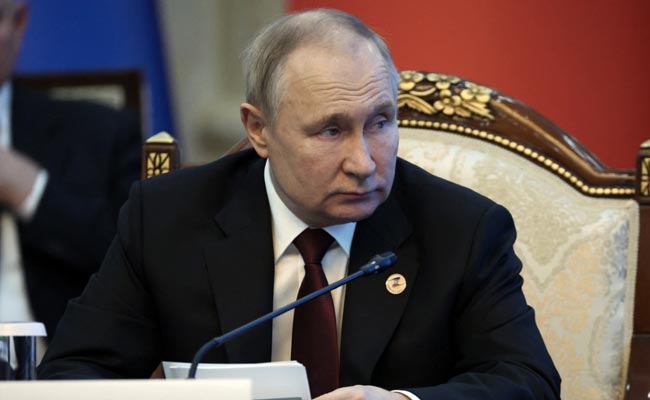Putin said he had issued orders to Wagner group to avoid bloodshed in country.
Moscow:
Russian President Vladimir Putin on Monday accused Ukraine and its Western allies of wanting Russians to “kill each other” during a revolt by mercenaries of the Wagner group, which stunned the country with an aborted march on Moscow over the weekend.
In his first address to the nation since the rebels pulled back, Putin said he had issued orders to avoid bloodshed, and granted amnesty to the Wagner fighters whose mutiny served up the greatest challenge yet to his two-decade rule.
“From the start of the events, on my orders steps were taken to avoid large-scale bloodshed,” Putin said in a televised address, thanking Russians for their “patriotism”.
“It was precisely this fratricide that Russia’s enemies wanted: both the neo-Nazis in Kyiv and their Western patrons, and all sorts of national traitors. They wanted Russian soldiers to kill each other,” Putin said.
Putin also thanked his security officials for their work during the armed rebellion in a meeting that included Defence Minister Sergei Shoigu, a main target of the mutiny.
“Civilian solidarity showed that any blackmail, any attempts to organise internal turmoil, is doomed to fail,” Putin said.
He added that Wagner fighters could choose whether to join the Russian army or leave for Belarus, or even return to their homes.
“Today you have the possibility to continue serving Russia by entering into a contract with the ministry of defence or other law enforcement agencies, or to return to your family and close ones… Whoever wants to can go to Belarus,” Putin said in his address.
Wagner boss Yevgeny Prigozhin had earlier defended his aborted mutiny as a bid to save his mercenary outfit and expose the failures of Russia’s military leadership — but not to challenge the Kremlin.
The rogue warlord’s first audio message since calling off his troops’ advance on Moscow was released as Russian officials attempted to present the public with a return to business as usual.
– ‘Internal Russian affair’ –
In Washington, National Security Council spokesman John Kirby said officials were monitoring “very closely” the turmoil in the nuclear-armed nation.
“We did have and were able to have in real time — through diplomatic channels — conversations with Russian officials about our concerns,” he said.
But the State Department said Ambassador Lynne Tracy in Moscow had contacted Russian officials “to reiterate what we said publicly — that this is an internal Russian affair in which the United States is not involved and will not be involved”.
Fighting continued in Ukraine, where Kyiv’s forces claimed new victories in their battle to evict Russian troops from the east and south of the country, but in the Russian capital, authorities stood down their enhanced security regime.
Prigozhin, who did not reveal from where he was speaking, said in an online audio message that his revolt was intended to prevent his Wagner force from being dismantled, and bragged that the ease with which it had advanced on Moscow exposes “serious security problems”.
“We went to demonstrate our protest and not to overthrow power in the country,” Prigozhin said, boasting that his men had “blocked all military infrastructure” including air bases along their route towards a point less than 200 kilometres (125 miles) from Moscow.
– Belarus option –
Prighozin called off the advance and pulled out of a military base his men had seized in the southern city of Rostov-on-Don, a nerve centre of the war in Ukraine, late on Saturday after mediation efforts from Belarus strongman Alexander Lukashenko.
Lukashenko was due to speak on the turmoil soon, according to his unofficial Telegram channel Pul Pervogo.
Prigozhin said Lukashenko had offered him a way of keeping the Wagner outfit — a key element in Russia’s military machine in Ukraine and in African and Middle East hotspots — operational.
Saturday’s extraordinary sequence of events — Russian military bloggers report that Wagner shot down six Russian helicopters and a command and control plane during their advance — has been seen internationally as Russia’s most serious security crisis in decades.
The Kremlin was at pains to stress that there had been a return to normal.
The Wagner headquarters in Saint Petersburg said it remained open for business, and Foreign Minister Sergei Lavrov said the firm would continue to operate in Mali and the Central African Republic.
Officials in Moscow and in the Voronezh region south of the capital lifted “anti-terrorist” emergency security measures imposed to protect the capital from rebel assault.
– ‘Moving forward’ –
Ukrainian military leaders, meanwhile, insisted they were making progress in the south and east of the country, and President Volodymyr Zelensky made a morale-boosting trip to troops fighting Russian forces near the city of Bakhmut.
“We are knocking the enemy out of its positions on the flanks of the city of Bakhmut,” eastern ground force commander Oleksandr Syrskyi said. “Ukraine is regaining its territory. We are moving forward.”
Ukrainian residents in the frontline town of Druzhkivka, near Bakhmut, also in Donetsk, told AFP that four explosions rocked a residential district overnight.
The blasts severed water and sewage pipes, shattered windows and threw up stones that hit yards and roofs, but municipal authorities said no one was hurt.
“It was a ‘fun’ night, we haven’t had this for a long time, it’s been quiet for a month or so,” said 66-year-old Lyubov, showing off the new hole in her cement-shingled roof.
(Except for the headline, this story has not been edited by NDTV staff and is published from a syndicated feed.)


